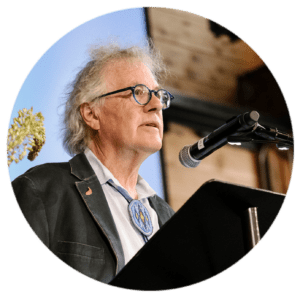In the spring of 2017, Project Drawdown released its inaugural body of work on climate solutions with the publication of the New York Times bestselling book Drawdown.

Founder
The 2017 Eagle Creek Fire in Oregon. KATU
In this latest string of extreme natural disasters, we are clearly entering a new geological epoch — the Anthropocene.

Portland woke up this week covered in ash and staring the impacts of global warming squarely in the face. The Eagle Creek Fire, which has engulfed the iconic Columbia River Gorge, swelled from 3,200 acres to more than 33,000 since Saturday — forcing not only evacuations of more than 400 nearby homes, but a reckoning for us all.
The rain forests of home are on fire. Eagle Creek is but one of hundreds of record-breaking wildfires across the continental West. Over a million acres have burned in British Columbia alone — the worst fire season on record for the province. And more than a million more are on fire in the American interior West. From central Idaho and Montana, to eastern Washington, across Oregon, down through Klamath Country in Northern California, all the way to Burbank — homes, communities, and beloved landscapes are under threat from increasingly devastating fire.
And despite the heroic efforts of thousands of firefighters — volunteers, national guardsmen, prison inmate crews, and agency veterans alike — many of these fires will burn largely unabated until fall rains in yet another “hottest year on record.”
I’ve seen many of these fires firsthand from the pilot’s seat of a small plane. In an admittedly ironic and complicit contribution to this tragic state of affairs, I’ve flown from Oregon to Alaska to coastal BC to the American Rockies and back over the last few weeks visiting many special places and remote communities who have called this place that I’ve come to know best as “Salmon Nation” their home for 10,000 years and more. My own family has made Portland home for five generations now and we, like so many others around us, have been stunned and saddened to see so much of this place we love go up in smoke.
Meanwhile, Hurricane Irma, the strongest storm ever on record in the Atlantic, has hurled herself through the Caribbean wreaking unprecedented damage on island communities and is still blowing at 180 miles per hour toward the coast of Florida as I write. Irma is one of three hurricanes active in the Atlantic, while Houston is only beginning to take stock of the devastation Hurricane Harvey delivered just a week ago. Already cited as the worst natural disaster in American history, Harvey shattered the total rainfall record for the continental United States at 51 inches of rain, damaging over 200,000 homes and destroying more than 13,000. Irma’s destruction remains to be told.
While none of these extreme weather events can be directly and exclusively linked to global warming, they are just the kinds of extremes that scientists have predicted while average global temperatures rise as a result of increased greenhouse gas emissions.
If it’s not clear what happens when greenhouse gases accumulate in earth’s fragile atmosphere, park your car in an asphalt parking lot on a hot summer day and roll up the windows. Same general idea. Or consider the facts: According to the Union of Concerned Scientists, the sea surface temperature in the Gulf of Mexico was 2.7-7.2 degrees Fahrenheit above normal, which allowed Harvey to quickly jump from a tropical storm to a category 4 hurricane. Houston has now experienced three “500-year” floods in three years, and the overall number of extreme weather events has risen by 40 percent in the last decade as our planet gets hotter every year.
Welcome to a new geological epoch driven largely by the effects of human activity on planetary life support systems. The goldilocks “Holocene” epoch of the past 10,000-12,000 years that brought a relatively benign climate in which modern human civilization developed is behind us. It’s time to confront a new climate reality.
The U.S. Forest Service now spends a majority of its annual budget fighting fires rather than keeping forests healthy and more fire-resistant in the first place. The Congressional Budget Office estimates that hurricanes cost an average of $28 billion in damages annually, but the superstorms we’ve come to know — Irma, Harvey, Katrina, Sandy — can have price tags at $100 billion or more. Yet development in coastal areas continues to surge with 1.2 million Americans currently living in coastal areas at risk of “substantial damage” from hurricanes — a number expected to rise to 10 million by 2075.
We are spending most of our time, energy, and money on effect rather than cause. It is time for a new world view.
Prince Charles, in his book Harmony: A New Way of Looking at the World, stated it well:
When people talk of things like an ‘environmental crisis’ or a ‘financial crisis’ what they are actually describing are the consequences of a much deeper problem … a ‘crisis of perception’. It is the way we see the world that is ultimately at fault. If we simply concentrate on fixing the outward problems without paying attention to this central, inner problem, then the deeper problem remains, and we will carry on casting around in the wilderness for the right path without a proper sense of where we took the wrong turning.
We’ve been living with a “wrong turn” of epic consequence — the idea that nature and people are commodities that can be controlled.
The careless and casual disregard with which the Eagle Creek Fire began last Saturday is both the story of naive and misguided youth growing up in a world disconnected from laws of nature, but also indicative of a more profound naiveté and hubris that our nation was built on. As deeply as Oregonians are mourning the loss of property and beloved landscapes from the fires in the Gorge — and they are significant — they can’t begin to reach the massive scale of the incomparable losses Native people suffered here in the colonization of their land and indifference to their culture.
So what do we do about this?
What we need to wake up to now is the opportunity for change. Of course the fires and storms brought immediate human tragedies and emergencies of life and property to address first and foremost. But there is also no time to waste in embracing new ways of living and doing business that will reduce the effects of global warming and honor the full integrity of the human race.
Here, in Salmon Nation, we have the chance to make a real difference. Paul Hawken, in his recent book Drawdown, describes the opportunity to not only reduce global emissions but reverse or “draw down” CO2 from the atmosphere in measurable and significant ways — through restoration of our forests, regenerative agriculture, green building, livable cities, reducing food waste, and more — all approaches that, by the way, also happen to be good ways to employ people and build economies.
While these are not the kinds of things that the current tyranny in our nation’s capital are encouraging, none of these things are mysterious or out of reach. They are the very things that result from the one growing resource available to communities worldwide: the infinite imagination of the human mind. But that capacity can be stimulated or suppressed by the dominant myths of our state of mind.
Instead of organizing solely as “nation states,” we could imagine “nature states”: alliances defined by our sense of place, our homes, our territory and the long history, culture, trade patterns and stories that define who we are.
Indeed, until we see humanity as part of, inseparable from, and utterly and totally dependent upon the larger living community of life and earth’s life support systems, neither fire nor flood will abate. We can and must see geological time, step back from the Anthropocene, and go forward towards, in the words of Jane Jacobs “a more reliable prosperity” supported by more stable climate.

Book
In the spring of 2017, Project Drawdown released its inaugural body of work on climate solutions with the publication of the New York Times bestselling book Drawdown.